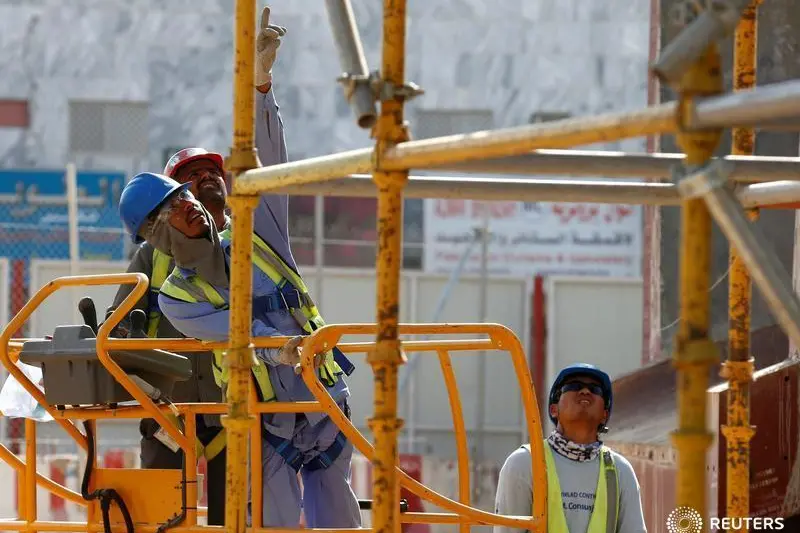PHOTO
Construction costs in the Middle East will increase marginally by one to two percent in 2018 compared to average increase of 4.3 percent globally due to the delayed impact of higher oil prices on real estate investments in the region, according to construction services firm Turner & Townsend.
The UK-headquartered firm's 2018 International Construction Market Survey report, released on Tuesday, analyses construction costs in 46 global markets including the United Arab Emirates (Dubai and Abu Dhabi), Muscat and Doha in the Middle East.
The report said the UAE will experience a two percent increase in construction costs in 2018, similar to last year, even as it rated the tendering conditions as "lukewarm," characterised by rising prices and growing competition for projects.
In comparison, both Doha and Muscat were rated as "cold," with "intense competition among contractors for very little work, reducing cost pressures".
While government investment in infrastructure ahead of Expo 2020 has helped to prop up construction spending in the UAE, the modest recovery in oil prices could prompt a marginal rise in government spending on projects, the report noted. These include major projects planned for Al Maktoum and Dubai South, and plans for a new housing development to house 200,000 UAE citizens.
In the case of Muscat, the report noted that after a 1 percent decline in construction costs in 2017 caused by a "flat real estate market", prices will increase by one percent in 2018 as the Khazzan gas field and the new Muscat airport boost economic development prospects.
It said the 17 percent reduction in Oman's state budget for 2018 would be made up by private sector investment in hospitality, tourism and infrastructure projects.
Doha's construction costs will increase by one percent in 2018 after a "negligible" 0.1 percent increase in 2017, the report said, noting that "disruption to supply chains in 2017 hindered both the economy and construction, but problems have eased with alternatives established and the opening of Hamad Port."
Construction activity in Qatar for the next five years will be led by 2022 World Cup-related infrastructure projects and pick-up in hospitality and entertainment real estate investments closer to the event.
Scoring on costs
In terms of the most expensive places to build, the UAE, with an average cost of $1,455 per square metre (sq m) and Muscat with $1,338 per sq m were ranked at 28th and 29th worldwide. To compare, New York retained its position as the most expensive place in the world to build with an average cost of $3,900 per sq m followed by San Francisco ($3,736.70 per sq m) and Hong Kong ($3,703.90 per sq m).
The Middle East also had second-lowest average hourly wage of all the regions analysed in this year's survey at $6.90/hour. Within the Middle East, Doha had the highest hourly wage of $8.90/hour.
And while almost 60 percent of the global markets surveyed reported a skills shortage, the UAE and Doha were in balance and Muscat was one of only three markets to show a skills surplus.
Commenting on the survey, Alan Talabani, Middle East managing director at Turner & Townsend, said that while governments in the region are keen to diversify their economies, "oil prices remain the most important factor influencing capital investment decisions in the region".
"As prices return to stable levels and the region prepares for major events such as the Expo 2020 Dubai, both governments and private investors should focus on the opportunity to drive better outcomes from their investment plans," he said.
In March, Thomson Reuters Projects reported that construction costs across the Middle East and North Africa (MENA) markets are set to increase after two difficult years during which project spending dropped by 40 percent.
The report, quoting a study by construction firm Mace, said 2018 is "expected to see a recovery in tender prices, driven in part by an uptick in activity and in part by growing costs."
(Reporting by Anoop Menon; Editing by Michael Fahy)
(anoop.menon@thomsonreuters.com)
Our Standards: The Thomson Reuters Trust Principles
Disclaimer: This article is provided for informational purposes only. The content does not provide tax, legal or investment advice or opinion regarding the suitability, value or profitability of any particular security, portfolio or investment strategy. Read our full disclaimer policy here.
For more data, analytics, tools and news on projects in the Middle East visit the Thomson Reuters Projects portal
© ZAWYA 2018





















